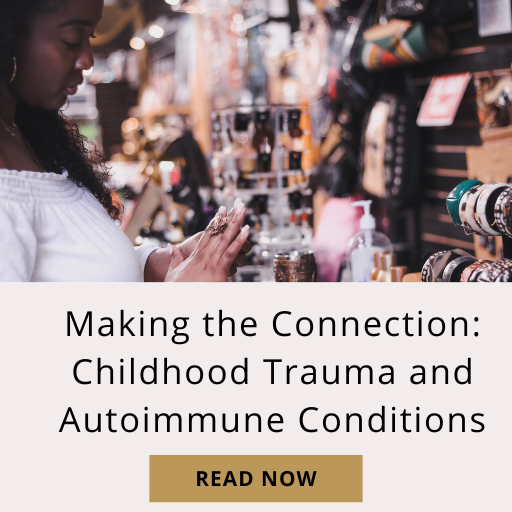Autoimmune diseases happen when your immune system mistakenly attacks your body’s own tissues, which leads to a wide range of symptoms and health issues. While some commonly recognized contributors are genetics and environmental factors, research has drawn a compelling link between childhood trauma and the later development of autoimmune conditions.
The Impact of Childhood Trauma
Childhood trauma can include physical, emotional, or sexual abuse; neglect; or growing up in a household with substance abuse, mental illness, or domestic violence or any combination of these. Experiences such as this can create chronic stress responses in children, which over time can dysregulate the immune system.

Dysregulation of the Immune System
When a child experiences trauma, their body goes into a state of heightened stress also called “fight or flight”. This ‘fight or flight’ response, while helpful in short-term dangerous situations, can become a problem if consistently activated. Over time, prolonged exposure to stress hormones like cortisol can lead to immune malfunction. This malfunction can show up as an overactive immune response, which is a common feature of autoimmune diseases.
Research Points
Studies have shown that people who have experienced childhood trauma are more likely to develop autoimmune diseases such as fibromyalgia, rheumatoid arthritis, lupus, and multiple sclerosis later in life. For instance, a pivotal study by researchers at the Centers for Disease Control and Prevention (CDC) and Kaiser Permanente found that those with a higher number of adverse childhood experiences (ACEs) had a significantly increased risk of autoimmune diseases.
Psychological Component
The psychological impact of childhood trauma can also exacerbate autoimmune conditions. Stress, anxiety, and depression, which are common with early life trauma, can trigger flares in diseases like psoriasis or inflammatory bowel disease (IBS). This connection shows us that addressing mental health is a critical component of managing and in many cases preventing autoimmune conditions.
Holistic Approaches to Treatment
Making the connection between childhood trauma and autoimmune conditions highlights how important it is to take holistic treatment approaches. These can include:
- Psychological Counseling: To address underlying trauma and improve mental health.
- Stress Management Techniques: Such as mindfulness, yoga, and meditation to help regulate the body’s stress response.
- Integrated Medical Care: Combining conventional medical treatments with complementary therapies.
The Future
Recognizing childhood trauma as a potential factor in autoimmune diseases can shift treatment approaches and patient care. It highlights a need for integrated care models that not only address the physical symptoms but also the emotional and psychological health of individuals.
As we continue to discover more about how early and even historical experiences shape our health, it becomes alarmingly clear that our medical approaches need to evolve further to address the full spectrum of human health.
Conclusion
The relationship between childhood trauma and autoimmune conditions offers a significant reminder of our biology and the connection to our emotional and physical health. By gaining a deeper understanding and developing more holistic treatment approaches, we can improve the lives of many who suffer from these challenging conditions.

